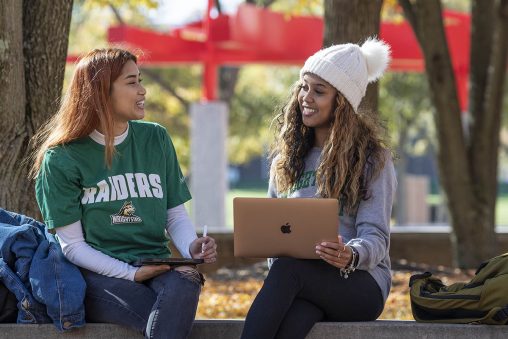
Peer Mentoring Programs connect students with a peer coach who is trained on Wright State resources and knows when to connect students to a success coach, advisor or student advocate. (Photo by Erin Pence)
Wright State University students can connect with older classmates for academic assistance and support in navigating the university through a variety of Peer Mentorship Programs.
Peer success coaches and academic study coaches are available to all Wright State students regardless of year.
Specialized programs are also offered for theatre students; first-year students in engineering, computer science, science and mathematics programs; LGBTQA+ students; and undergraduate students who identify as women of color.
Peer Mentoring Programs connect students with a peer coach who is trained on Wright State resources and knows when to connect students to a success coach, advisor or student advocate.
“Students naturally share more openly with fellow students about the challenges they are facing,” said Catherine Amaris Hernandez Hogan, a success coach on the Student Retention Team in the Division of Student Success.
Connecting students with peer mentors can remove barriers and help students who may feel intimidated sharing challenges with faculty or staff members, she said.
“The peer mentor connection is powerful because you are not only meeting a need, but you are creating community for that student,” Hogan said.
Peer Mentoring Programs can be especially useful for first-year and first-generation students who may not understand the university culture when they first arrive at Wright State.
“To be able to come to a new environment like Wright State and get connected with a student who is like a big brother or big sister is comforting and impactful,” Hogan said. “You never have to do the university experience alone. You can walk alongside someone who has done it before and been successful.”
The Peer Mentorship Council provides a platform through which staff and faculty members in Wright State’s peer mentorship programs can collaborate, share resources and discuss best practices.
“We work with the mantra of ‘it takes a village’ to help students achieve their goals,” Hogan said. “We can all work together to help that student cross the finish line.”
The Peer Success Program is open to all students. It matches students with a peer coach for regular check-ins that encourage and help a student navigate Wright State. Last semester, seven peer coaches mentored about 70 students.
Students shared that the program helped them with accountability and guidance; improving time management skills; setting SMART goals for the semester; staying motivated, organized and dedicated to their studies; and connecting to campus.
“We find that programs like this are essential in light of the pandemic and how isolated students feel,” said Hogan, who oversees the program.
If the Peer Success Program is not a good fit for a student, Wright State offers many other peer mentorship programs for students.
These include:
Study Coaches: Open to all students. Study coaches help students develop a deeper understanding of class material and gain successful skills that can improve their overall GPA. They assess student academic strengths and challenges to help students develop individualized strategies for their courses. Learn more.
Peer Mentoring in Acting and Musical Theater Programs BFA: Open to all students in Theater Program; connects theatre students with a peer mentor for support and regular follow-up. Learn more by contacting Joe Deer.
College of Engineering and Computer Science Student Ambassador/Mentor Program: Open to first-year engineering and computer science students. Provides biweekly follow-up for problem-solving, study skills and campus resources. It encourages students to create healthy social interactions in the college, university and community. Learn more.
College of Science and Mathematics Student Engagement Mentoring Program (C-SEMP): Open to all first-year students in science and mathematics majors. Engages and connects first-year students with continuing students in the college to help with the transition to college and understand the research and academic expectations for science and math majors. Learn more by contacting Nick Christian.
Unicornship Peer Mentor Program: Open to first-year students utilizing LGBTQA+ Affairs services. Helps students reach personal and academic goals learn more about how to navigate Wright State as an LGBTQA+ student. The program helps students who are building community and family. Learn more.
Women of Color Student Mentorship and Leadership Cohort: Open to undergraduate students who identify as women of color. Organized by the Women’s Center, the program provides an empowering environment for students interested in mentorship, leadership and community building. Learn more.
Get more information about Wright State’s Peer Mentoring Programs.

 Wright State psychology team studies ways to identify fatigue in pilots, drivers
Wright State psychology team studies ways to identify fatigue in pilots, drivers  Wright State videographer Kris Sproles wins Regional Emmy and Ohio journalism award
Wright State videographer Kris Sproles wins Regional Emmy and Ohio journalism award  Wright State Boonshoft School of Medicine ranked among the nation’s best for 2024 by U.S. News
Wright State Boonshoft School of Medicine ranked among the nation’s best for 2024 by U.S. News  Exposing biotechnology
Exposing biotechnology  Wright State faculty member Dan Noel uses unique background to inspire new leaders
Wright State faculty member Dan Noel uses unique background to inspire new leaders 